T: Manage Budgets and Forecasts
30 Pages6417 Words344 Views
Added on 2020-04-21
About This Document
ASSESSMENT WORKBOOK Participant Name: Learner ID/Username: Assessment Workbook T Manage Budgets and Forecasts V1.0 Produced 1 February 2016 Copyright 2016 All rights reserved. Date Summary of Modifications Made Version 1/02/16 Version 1 produced following assessment validation V1.0 Getting Started Instructions This workbook contains one (1) assessment comprised of: Questions – A set of generic questions testing the student’s general knowledge and understanding of the general theory behind the unit. Exercises - A set of exercises
T: Manage Budgets and Forecasts
Added on 2020-04-21
ShareRelated Documents
Manage Budgets and ForecastsThis course is based on the nationally recognised unit of competency:●FNSACC503 Manage budgets and forecastsIt covers the skills and knowledge required to prepare, document andmanage budgets and forecasts, and encompasses forecasting estimatesand monitoring budgeted outcomes. ASSESSMENT WORKBOOKParticipant Name:Learner ID/Username:
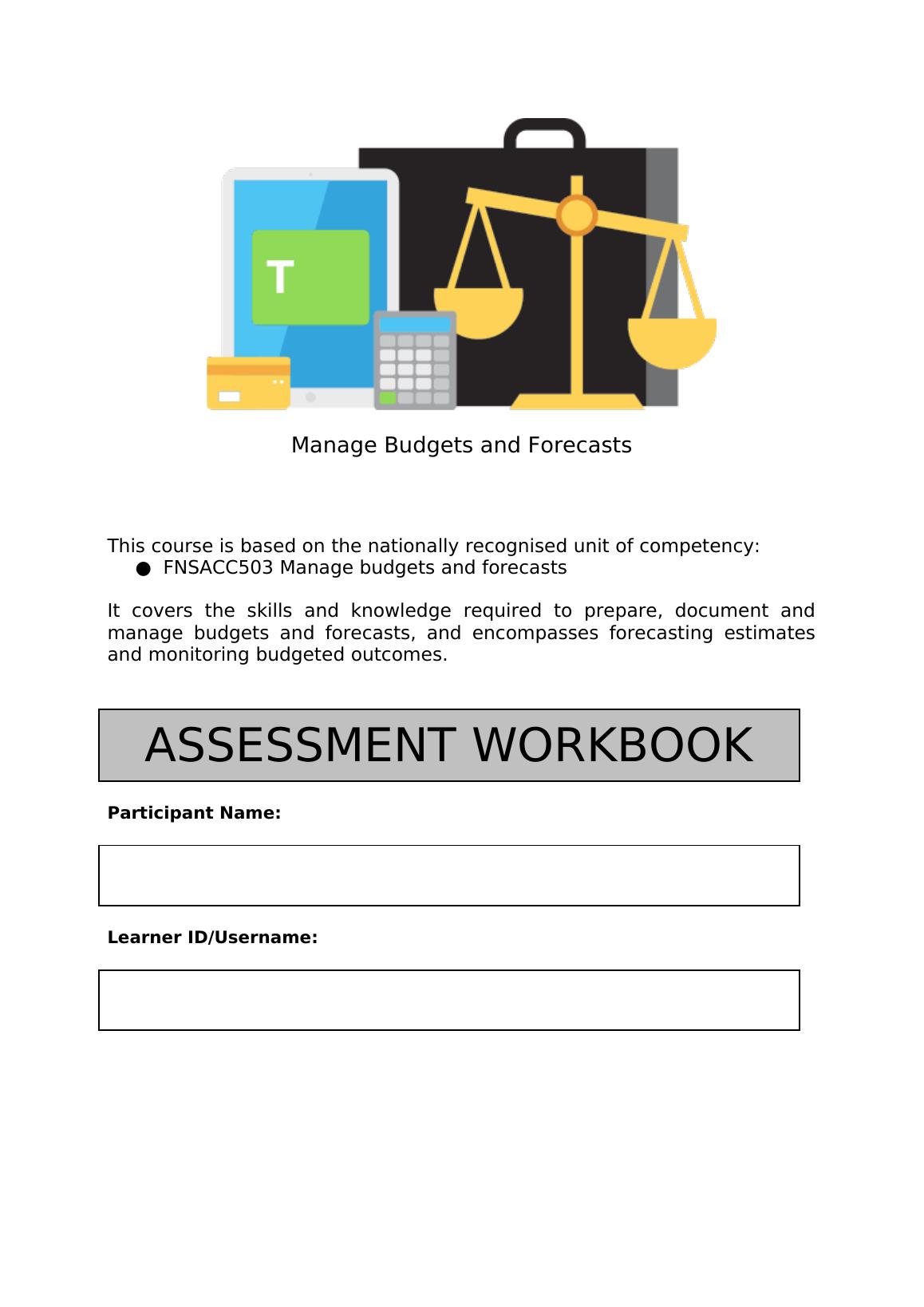
Assessment Workbook T: Manage Budgets and Forecasts Assessment Workbook TManage Budgets and ForecastsV1.0 Produced 1 February 2016Copyright © 2016 All rights reserved. No part of this publication maybe reproduced or distributed in any form or byany means, or stored in a database or retrieval system other than pursuant to the terms of theCopyright Act 1968 (Commonwealth).DateSummary of ModificationsMadeVersion1/02/16Version 1 produced followingassessment validationV1.0Page 1
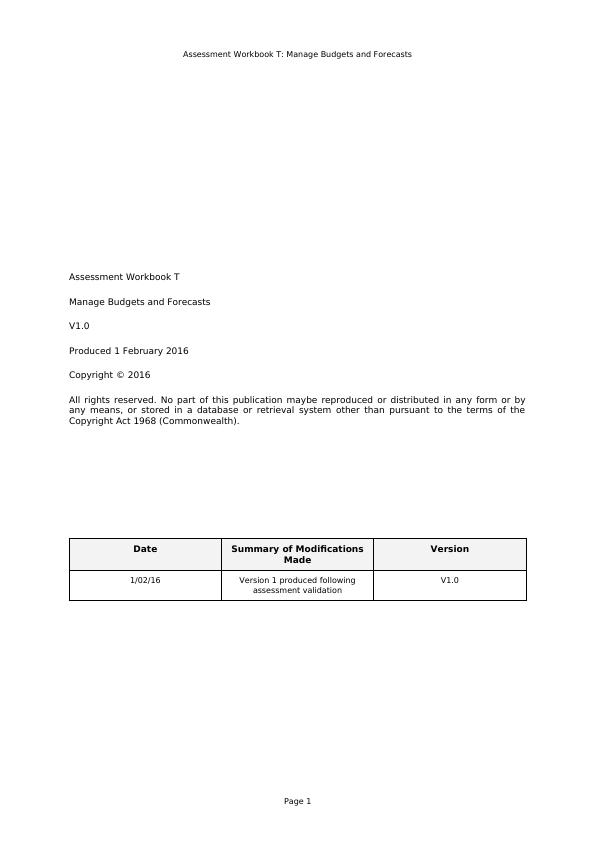
Assessment Workbook T: Manage Budgets and Forecasts Getting StartedInstructionsThis workbook contains one (1) assessment comprised of:●Questions – A set of generic questions testing the student’s generalknowledge and understanding of the general theory behind the unit.●Exercises - A set of exercises to test the student’s knowledge,analytical skills in problem solving and performing numericalcalculations.●Practical Task – A hypothetical case study to test the student’sknowledge, analytical skills in problem solving and performingnumerical calculations.‘Questions’ cover generic underpinning knowledge of course terms andconcepts. These questions are all in a short answer format. The longerquestions requiring creative thought processes are covered in the casestudies assessment. You must answer all questions using your ownwords. However you may reference your learner guide, and other onlineor hard copy resources to complete this assessment.‘Exercises’ cover processes you would be likely to encounter in aworkplace. Ideally you should be able to answer these questions based onthe processes that are currently in place in your workplace. If this is not thecase, then answer the questions based on processes that should beimplemented in your workplace.The ‘Practical Task’ is based on a case study in a service or tradingorganisation. If you are currently working in an accountancy role, you mayanswer these questions based on your own workplace. Otherwise considerwhat you should do if you were working.Requirements for satisfactory completionFor a ‘satisfactory’ result for each component of this workbook, all tasksmust be addressed to a ‘satisfactory’ standard. It is important you;Page 2
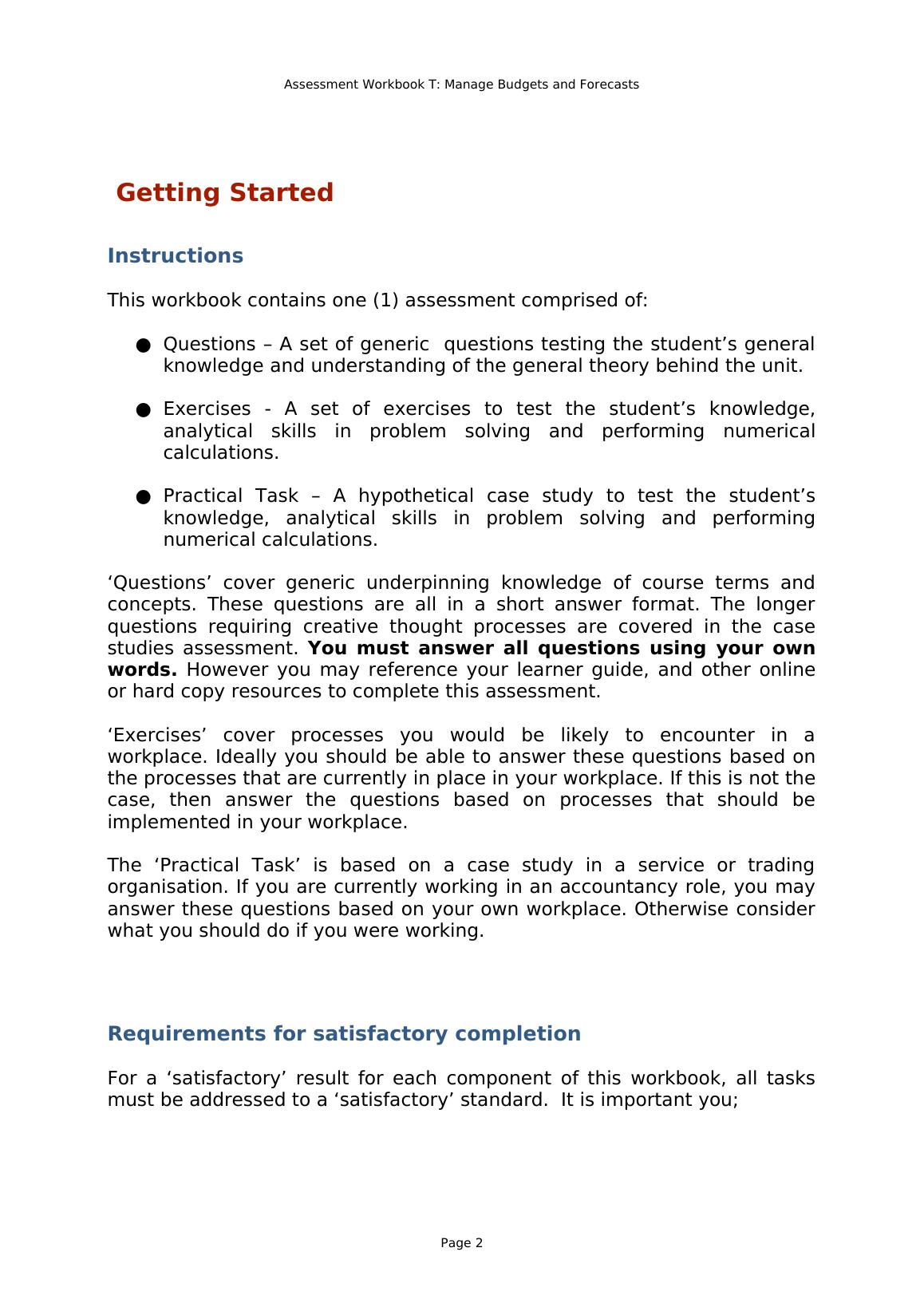
Assessment Workbook T: Manage Budgets and Forecasts 1.Provide responses using complete sentences, making directreference to the question.2.Specifically address all parts of the question providing exampleswhere appropriate.Competency Based AssessmentCompetency based assessment focuses on whether you are able toperform the task to the standard expected in the workplace. It relies onyou providing evidence that supports your claim of competence. Thisevidence is in the form of your completion of the assessments set for eachunit.Once you have submitted your completed assessments, your instructor willassess your submission to determine your competence. To be deemedcompetent in each course, you are required to achieve a satisfactory resultfor all of the assessment components that make up that unit. Where a ‘notyet satisfactory’ judgement is made, you will be given guidance on steps totake to improve your performance and provided the opportunity to re-submit evidence to demonstrate competence. Once a ‘satisfactory’judgement has been made on all components for a unit, you will bedeemed ‘competent’ in that unit.SubmissionOnly submit your workbook once all activities inside are complete. Shouldyou have any questions regarding your assessments, or not understandwhat is required for you to complete your assessment, please feel free toask your instructor.Keep your answers succinct and make sure you are answering thequestion. Re-read the question after you have drafted up your responsejust to be sure you have covered all that is needed.Your final assessment result will either be ‘Competent’ or ‘Not YetCompetent’. When submitting your assessments please ensure thatPage 3
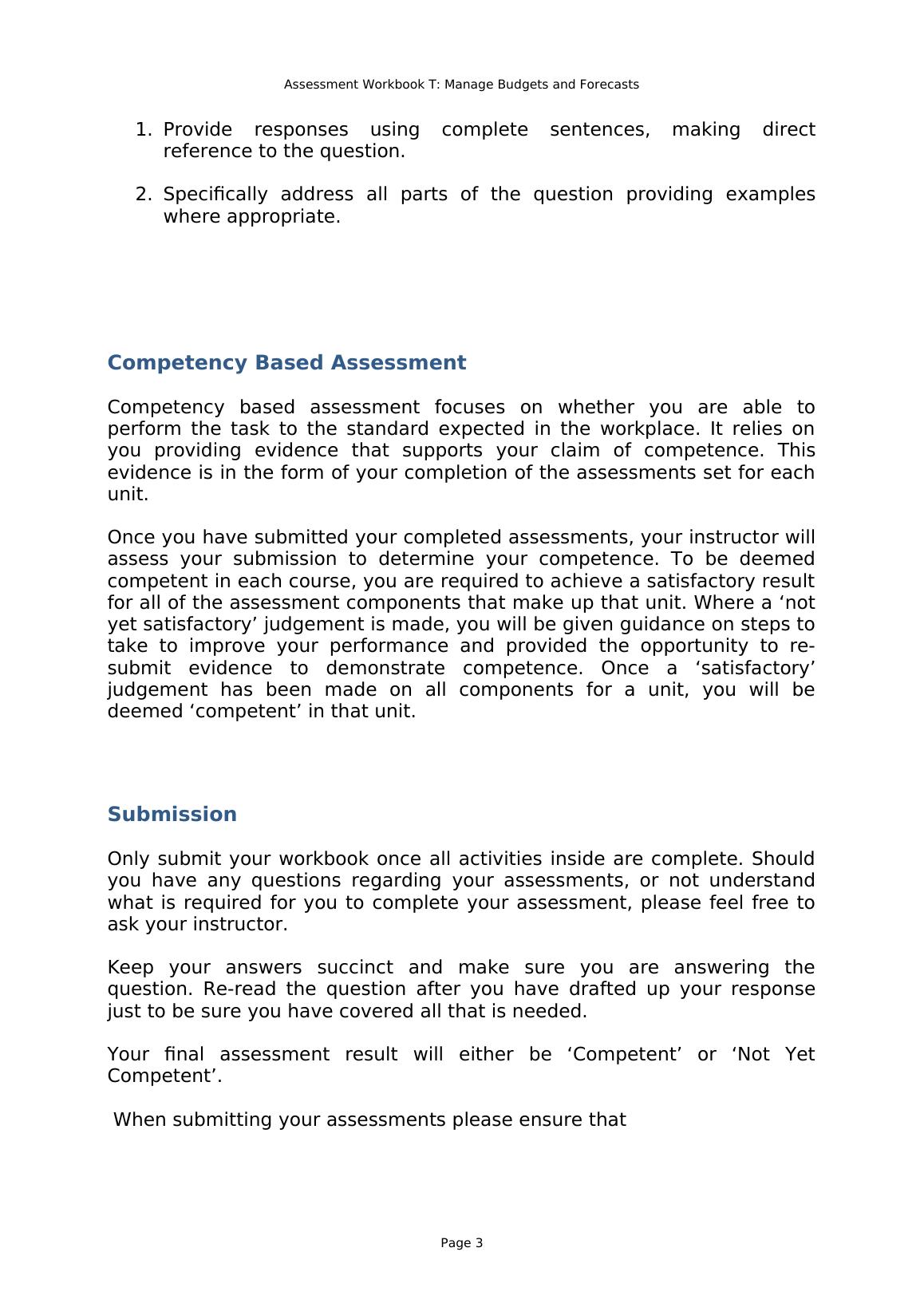
Assessment Workbook T: Manage Budgets and Forecasts 1. All assessment tasks within the workbook have been completed2.You have proof read your assessmentCandidate Declaration Submission of this workbook means you agree to abide by the terms of thecandidate declaration below.By submitting this work, I declare that:●I have been advised of the assessment requirements, have beenmade aware of my rights and responsibilities as an assessmentcandidate, and choose to be assessed at this time.●I am aware that there is a limit to the number of submissions that Ican make for each assessment and I am submitting all documentsrequired to complete this Assessment Workbook.●I have organised and named the files I am submitting according tothe instructions provided and I am aware that my assessor will notassess work that cannot be clearly identified and may request thework be resubmitted according to the correct process.●This work is my own and contains no material written by anotherperson except where due reference is made. I am aware that a falsedeclaration may lead to the withdrawal of a qualification orstatement of attainment.●I am aware that there is a policy of checking the validity ofqualifications that I submit as evidence as well as thequalifications/evidence of parties who verify my performance orobservable skills. I give my consent to contact these parties forverification purposes.Page 4
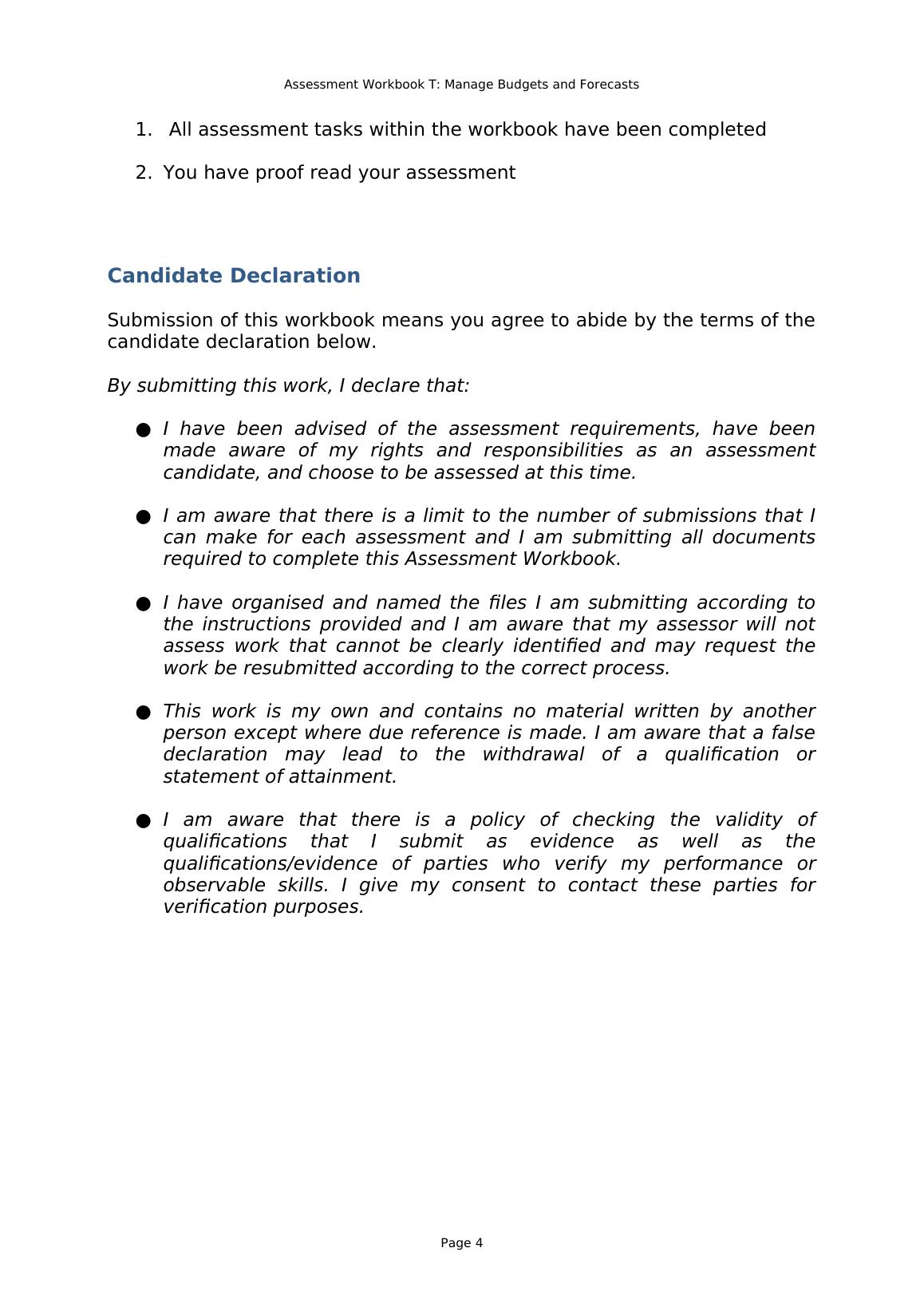
Assessment Workbook T: Manage Budgets and Forecasts QuestionsThe first part of the assessment covers generic underpinning knowledge ofbasic budgetary terms and concepts. These questions are all in a shortanswer format. The longer questions requiring creative thought processesare covered in the second part of the assessment and the case study. Youmust answer all questions using your own words. However you mayreference your learner guide, or other online or hard copy resources tocomplete this assessment.TQ1: Describe the purpose of budgeting. Budgeting is one of the important tools that are used for keepingtrack of much information. By using budgeting techniques, one cancontrol the finances in an effective way. The main purpose of thebudgeting is to control spending. By using budgeting, individual can trackinformation about where money is being spent and consciously findingways on where money can be saved in future. By proper budgeting, it willhelp in making better financial decisions as well as spending thatmatches the priorities. The main purpose of budgeting is to get out of debt. Preparation ofbudget will help individual to free up extra money per month. Onceindividuals are out of debt, they will be free to save up more money eachmonth. The purpose of budgeting is wealth building as it allowsindividuals to save and begin with investing money wisely. Budgetpreparation will help in meeting the legal requirements as well asestablishing spending and income raising authority. On preparing abudget, it helps in establishing a work program for given financial yearthat meet the objectives. The main purpose of the budget is to manageas well as control the resources. TQ2: List the five (5) activities that form the budgeting process.1.Determining the flow of information- One of the activity that form budgetingprocess is determining the information flow. It is essential for a company to gatherdata that is needed for preparation of a budget in different ways. Budgets need to beprepared in a way that is easy to execute. 2.Deciding upon what is going to measure- One of the activity that form budgetingPage 5
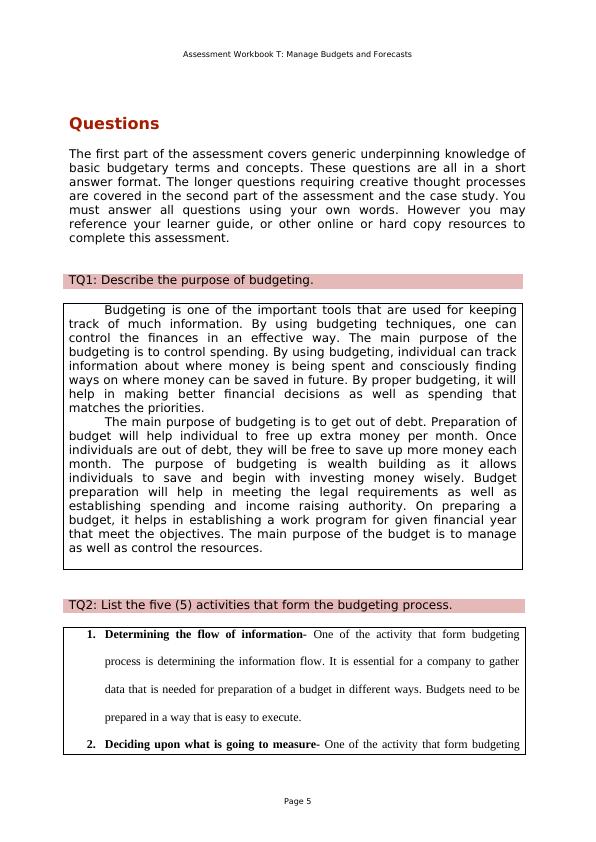
End of preview
Want to access all the pages? Upload your documents or become a member.
Related Documents
FNSACC507 Provide Management Accounting Informationlg...
|44
|8213
|100
FNSACC501 Provide Financial and Business Performance Informationlg...
|43
|8398
|34
FNSACC502 Prepare Tax Documentation For Individualslg...
|43
|9628
|56
FNSACC504 - Prepare financial reports for corporate entitieslg...
|38
|8133
|200
FNSACC506 Implement and Maintain Internal Control Procedures - Assignmentlg...
|47
|8273
|93
Program Design and Implementation Guide for CHC50113 Diploma of Early Childhood Education and Carelg...
|78
|14103
|169
